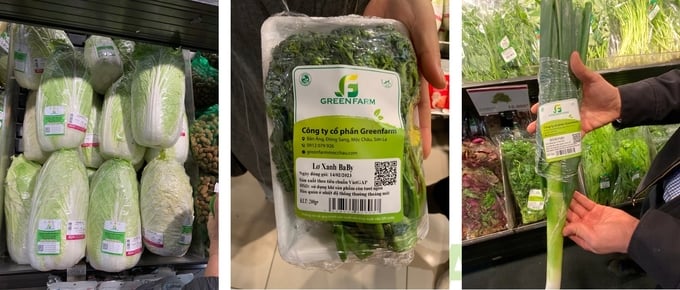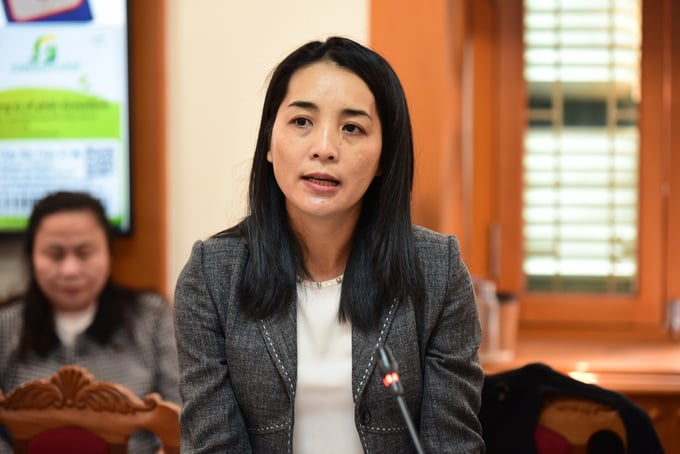November 25, 2025 | 07:37 GMT +7
November 25, 2025 | 07:37 GMT +7
Hotline: 0913.378.918
November 25, 2025 | 07:37 GMT +7
Hotline: 0913.378.918

Vegetable products from the project receive positive reviews from retailers.
At the forum “Promoting digitalization in agro-product and food traceability” held today, representatives of the Australian Center for International Agricultural Research (ACIAR) have come to share some results of the project concerning the usage of digital tools in the management of agro-product value chains.
According to Ms. Nguyen Thi Nga, Project Coordinator, the project "Pilot digital monitoring of VietGAP compliance and quality control in Vietnam's vegetable value chain" was sponsored by ACIAR and implemented by Applied Horticultural Research (AHR), Northern Mountainous Agriculture and Forestry Science Institute (NOMAFSI), and Hitachi Vantara Corporation.

ACIAR’s new project utilizes digital tools in vegetable production management.
Moc Chau, a land suitable for growing many kinds of temperate vegetables, was chosen to execute the project. Moc Chau has enough land to cultivate (40.000 ha), and it is not too far from Hanoi (approximately 200 km). Having those characteristics, ACIAR has had many support projects in Moc Chau since 2021. As a result, every year 70,000 tons of vegetables are collected from Moc Chau and Van Ho, thus a vegetable industry worth AUD 30 million (in 2021) was well-established.
Some activities of the project include creating an electronic recording application for farmers to fill in the information regarding production on the field; the EscavoxTM device that measures temperature, humidity and provides GPS location; on-farm label printing with information about the product, QR codes and barcodes for retailers and consumers; VietGAP compliance tracking log for each shipment which compliance reports are stored in the cloud.
The project team has conducted several surveys, and the data shows that most consumers believe that packaging, certification and labeling are important. The majority of respondents use QR codes to check products, but they didn't check often and instead have more faith in the brand. QR codes are considered useful for products that are consumed fresh such as tomatoes, cucumbers, and thin-skinned fruits. After scanning a QR code, consumers usually want to see information such as production area, packaging facilities, product package weight, expiry date, and certification.
Vegetable products from the project receive positive reviews from retailers, such as AEON (supplied by Greenfarm SJC) and MegaMarket (supplied by Nature Safe Vegetables Cooperative). But it is important to note that thanks to applying digitization in the vegetable value chain, the project has brought immense benefits for farmers: more orders, better quality, longer storage, better proof of traceability, and higher selling price.

(VAN) ILDEX Vietnam 2026 will connect more than 250 exhibitors and 10,000 visitors from 40 countries.

(VAN) Hue City is accelerating efforts to combat IUU fishing, aiming to remove EC’s 'yellow card' and promote sustainable fisheries development.

(VAN) The recent torrential downpours and unprecedented flooding in the Southern Central Coast are a highly unusual meteorological and hydrological event.

(VAN) The Southern Central Coast and Central Highlands regions have suffered massive agricultural losses, with over 80,000 hectares of rice and crops, alongside millions of livestock, being swept away, causing severe damage to farmer livelihoods.

(VAN) Trieu Son commune deploys a 'virtual assistant' to help residents complete administrative procedures.

(VAN) Applying green technology in rural water supply and sanitation helps improve resource efficiency, protect the environment, and enhance community living standards.

(VAN) Developing biosecure livestock production is the key that helps Tuyen Quang form linked chains in livestock production and build its brand in the market.